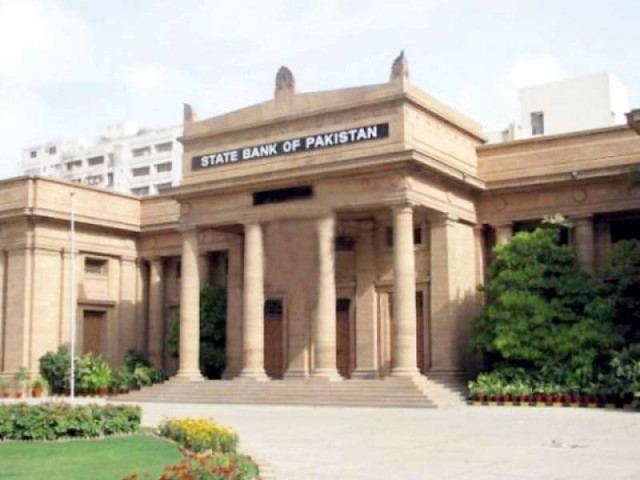State Bank of Pakistan's interest rate decision may catch experts by surprise
Many research houses anticipate rise in policy rate while others expect no change

A further increase in interest rate would make the challenge of overcoming the shortfall in revenue collection even bigger and further widen the fiscal deficit. PHOTO: FILE
The Express Tribune conducted a brief market survey and asked around 10 research houses about their expectations for revision in the policy rate for the next two months.
Three of them said they anticipated no change, two expected a 25-basis-point hike, three predicted a 50-basis-point increase and two saw a 75-basis-point rise. A research house took a totally opposite stance, saying the central bank may revise down the policy rate by 25-50 basis points.
Those, who think the rate would remain unchanged, argued that inflation had peaked and it was no more the focus of the committee.
A further increase in interest rate would make the challenge of overcoming the shortfall in revenue collection even bigger and further widen the fiscal deficit, which has become the largest challenge for the economic managers these days.
They said a 4.5-percentage-point increase in interest rate since January 2018 to a six-year high of 10.25% has already started delivering desired results like reducing aggregate demand in the economy, which was very much evident from a slowdown in the real economic growth and hence further tightening of the monetary policy was not needed.
Others were of the view that even though there was no need for increase in the rate, the central bank would make a token increase of 25 basis points for reasons including Pakistan was negotiating a bailout package with the International Monetary Fund (IMF), which had been insisting on a significant increase in the rate as a pre-condition for the bailout.
Those, who foresaw an aggressive increase in the rate of 50-75 basis points, argued that inflation was set to hit a five-year high at around 9.1% for March 2019 and that higher yields on three, six and 12-month treasury bills indicated a hike in interest rate on Friday.
Aba Ali Habib Securities, however, said in comments to its clients on Monday “investors anticipate a 25 to 50-basis-point drop in the SBP’s monetary policy stance to be announced at the end of this week.”
Emerging Economics Research MD Muzammil Aslam expects no change in the policy rate for the next two months.
“Slack demand is clearly evident. Resultantly, the current account is heading towards its long-term trend. Moreover, growth slowdown is more than expected. Further monetary tightening may dampen growth prospects and hence revenue growth,” he said.
“This will push fiscal balance further higher. The fiscal balance is now the prime concern, but this time it has more to do with subdued revenue growth. Hence, we expect no change in the monetary policy.”
BMA Capital economist Fawad Khan, who also expected no change in interest rate, said “inflation has peaked out. It is set to remain stable. Real interest is firmly positive. And external environment is supportive.”
Elixir Securities’ Investment Banking Director Hamad Aslam foresaw a 25-basis-point hike owing to rising CPI inflation, which was expected to touch 8.7% in March 2019 against 8.2% in February 2019.
“Market noise and T-bill secondary market yields indicate a bigger increase (of 50 basis points), but we believe that is exaggerated due to concerns over IMF’s condition. Real interest rate is expected to stand at 2.1% in March 2019 which, we believe, would be sufficient for now,” he added.
Insight Securities’ analyst Zeeshan Afzal also expected a 25bps hike. “There is no need for meaningful monetary tightening but we expect another token rate hike of 25bps in March MPC (monetary policy committee) meeting, as economic policies under IMF program are still uncertain and would take shape by April end when IMF staff level mission will arrive in Pakistan.”
Taurus Securities said in a commentary to its clients that it expects a 50 basis points hike keeping in view the rising inflationary pressure. “A 50bps hike would give the country a 200bps cover over average inflation in the fiscal year.”
Arif Habib Limited Head of Research Samiullah Tariq said they were expecting a 75 basis points hike.
“The monetary tightening is expected on the back of rising inflationary pressure due to recovery in prices of petroleum products and essential food items; mounting fiscal deficit despite sharp cut in PSDP (development budget) and rationalisation of tariffs and duties; and narrowing real interest rate as it declined to 1.6% compared to last four year average of 2.85%.”
Sherman Securities’ analyst Chander Kumar expected a 50-75bps hike due to narrowing real interest rate.
“CPI inflation in March is expected to touch a five-year high of 9.1% which will result in narrowing down of real interest rate which has already shrunk to 2% in February from five-year historic average of 2.5%,” he noted.
Published in The Express Tribune, March 29th, 2019.
Like Business on Facebook, follow @TribuneBiz on Twitter to stay informed and join in the conversation.


















COMMENTS
Comments are moderated and generally will be posted if they are on-topic and not abusive.
For more information, please see our Comments FAQ